Turkey cooking mistakes
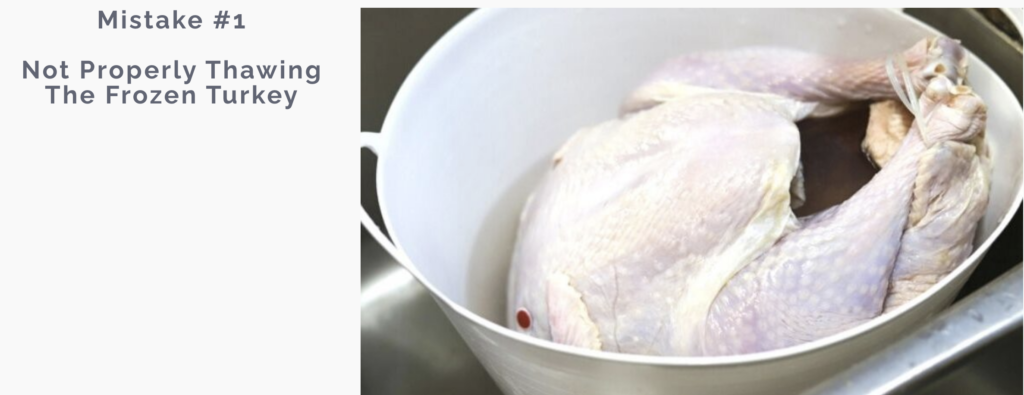
When it comes to thawing the bird- the key is to think ahead.
- How many pounds do you have?
- How many days will you be required to leave it in the refrigerator to reach its thawing point?
The dangerous mistake occurs when the turkey is not thawed in the refrigerator. Never thaw on the counter or just sitting in a sink full of water.
The FDA guideline states frozen food of any kind should only be thawed in one of 3 ways:
- In the refrigerator
- Under continuous running cold water
- In the microwave. (If food is thawed in the microwave it must be cooked immediately.)
Thankfully Butterball has a calculator that will help you plan
- How much turkey you need by weight
- How long to thaw a frozen turkey by the pound
- How long your cook time will be
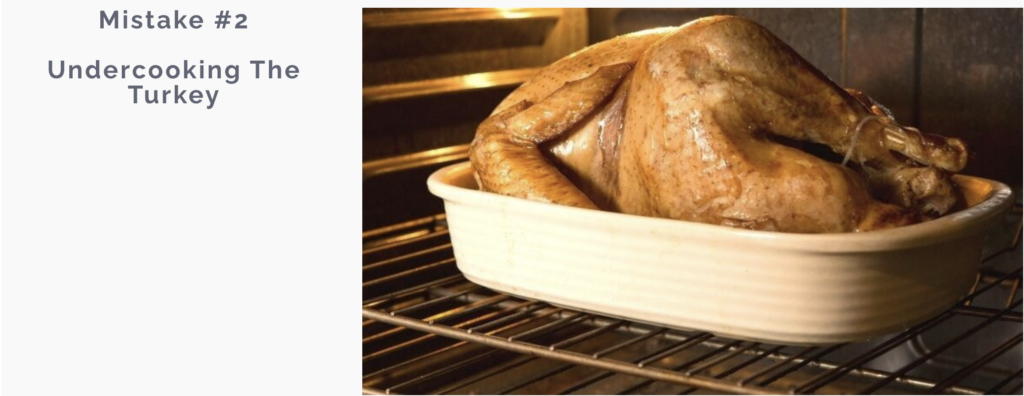
Cooking a turkey can be a daunting task if you have never done so. Be sure to remove all of the innards and the neck which will be tucked inside. You can use them to make a stock for the gravy.
The danger lies in the internal cooking temperature of the turkey. Turkey is considered poultry and the FDA urges that all poultry must be cooked until it reaches an internal temperature of 165 degrees F.
Make sure you have tested your food thermometer. Keep it handy and check various parts of the bird. It is not done until every area you insert the thermometer in reads at least 165 degrees F. To test the accuracy of your thermometer you can place it in a glass of ice water for thirty seconds. If it reads 32 degrees F your device passes the test.
Properly reheating side dishes
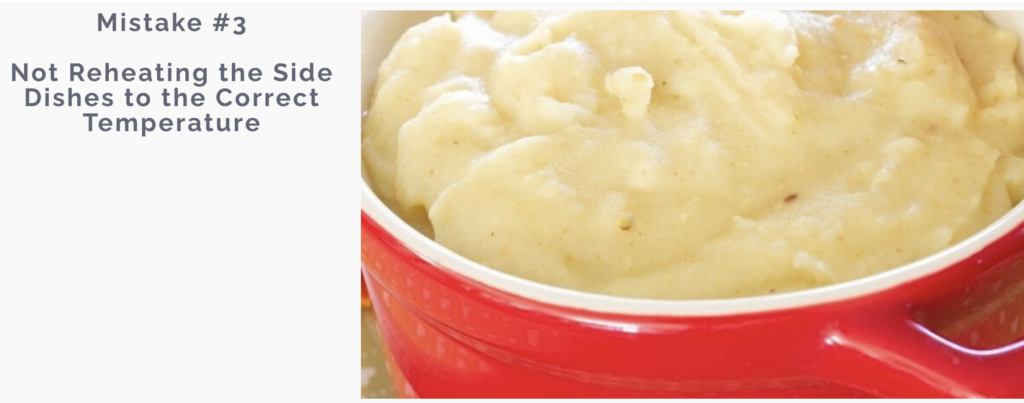
Most people will make at least a few of the Thanksgiving side dishes ahead of time. This makes perfect sense considering how much cooking is involved.
Where this can become dangerous is assuming that since a side dish was once cooked properly it can be served with just the chill removed. All ready-to-heat food is required to be heated until an internal temperature reaches 165 degrees F.
The reason you must reheat to an internal temperature of 165 F is that bacteria grow very rapidly as food passes through what is called the temperature danger zone.
The temperature range for the danger zone is 40F-140 degrees F. These little bacteria can make someone very ill. Especially when it comes to children, the elderly, pregnant women, and anyone who may be immunocompromised. Think about who might be sitting at your table this holiday season and use your thermometer to check temps as you reheat the side dishes.
Properly refrigerating food sooner than later
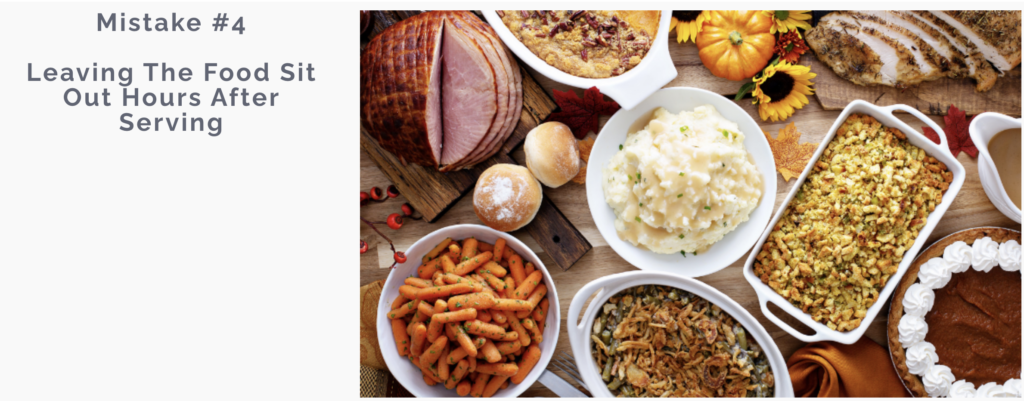
Many people have a sit-down family-style meal where everyone passes each delicious dish one at a time. Other households prefer to serve a wonderful buffet-style meal in which everyone makes a plate from a central location and carries their Thanksgiving dinner to their own seat.
Regardless of how you prefer to dine, food-safety should still be top of mind.
Remember the old days where children were always instructed to wash their hands before dinner? This is still a great idea, in fact, in a post-pandemic world, everyone should wash their hands before sharing serving utensils. You as the cook should be washing in between touching each food item.
When it comes to serving your Thanksgiving feast the biggest rule of thumb is to not let any of the food sit out for more than two- hours. Once everyone has had time to eat, pack up the food, and get it in the refrigerator. If it is still hot or warm, simply divide it into smaller containers.
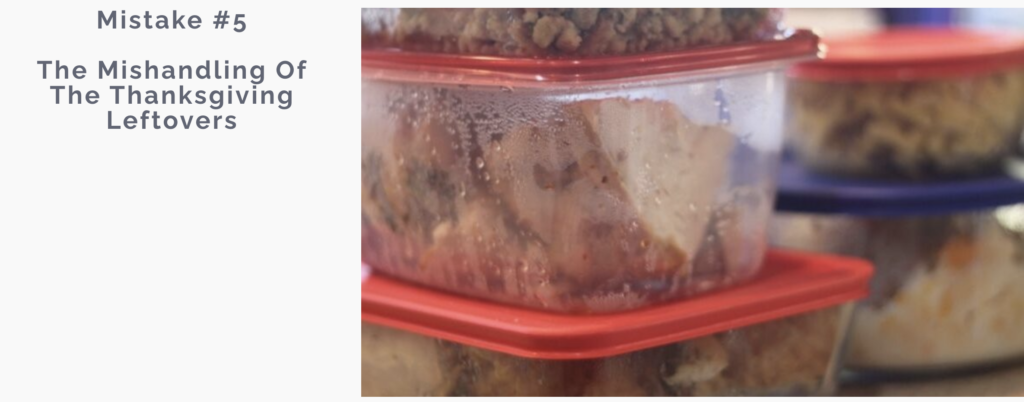
Packing food in small containers with leftovers in them makes sense on so many levels.
- If you are packing that leftover turkey stuffing and gravy into single-use disposable containers, your wonderful Thanksgiving leftovers can be offered to your guests as they leave.
- If the containers are reheatable, you can portion out some ready-to-go meals for your family too.
In the long run, this is the most efficient way to eat all the lovely thanksgiving food items in a timely manner. We live by the food-safety 3-day rule. By Sunday night all the leftovers must be frozen or thrown out. Make sure you follow the food safety rules of reheating foods to 165 degrees F also. Yes, you can eat the turkey meat cold, but if want some mashed potatoes and gravy or mac and cheese, remember to use the thermometer.
When it comes to food safety, you really cannot pick and choose. Bacteria and viruses are part of the world around us. We must learn to live with them and use the knowledge at hand to protect those around us.
As the cook and or the host of a meal, it is your responsibility to ensure that you have properly warded off the potential spread of viruses and properly killed off any bacteria that can potentially make you or someone you love ill. Having a happy holiday season starts with being healthy.
Remember: thaw food properly, cook poultry to 165 degrees F, reheat foods to 165 degrees F, refrigerate leftovers within two hours, freeze or discard leftovers after three days and wash your hands, wash your hands, wash your hands.
Have a Happy and Healthy Thanksgiving!
To learn more about safe and healthy meal prep visit our site at Meal Prep Made.


